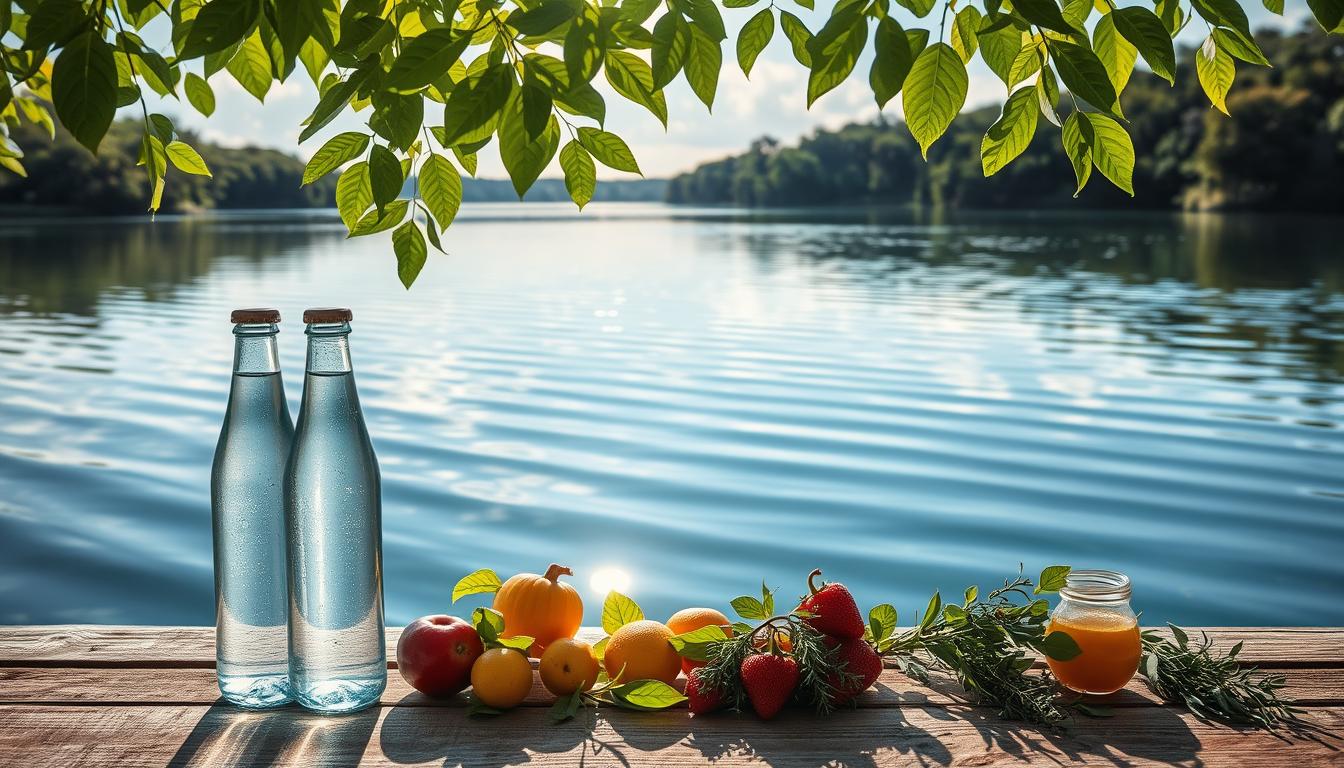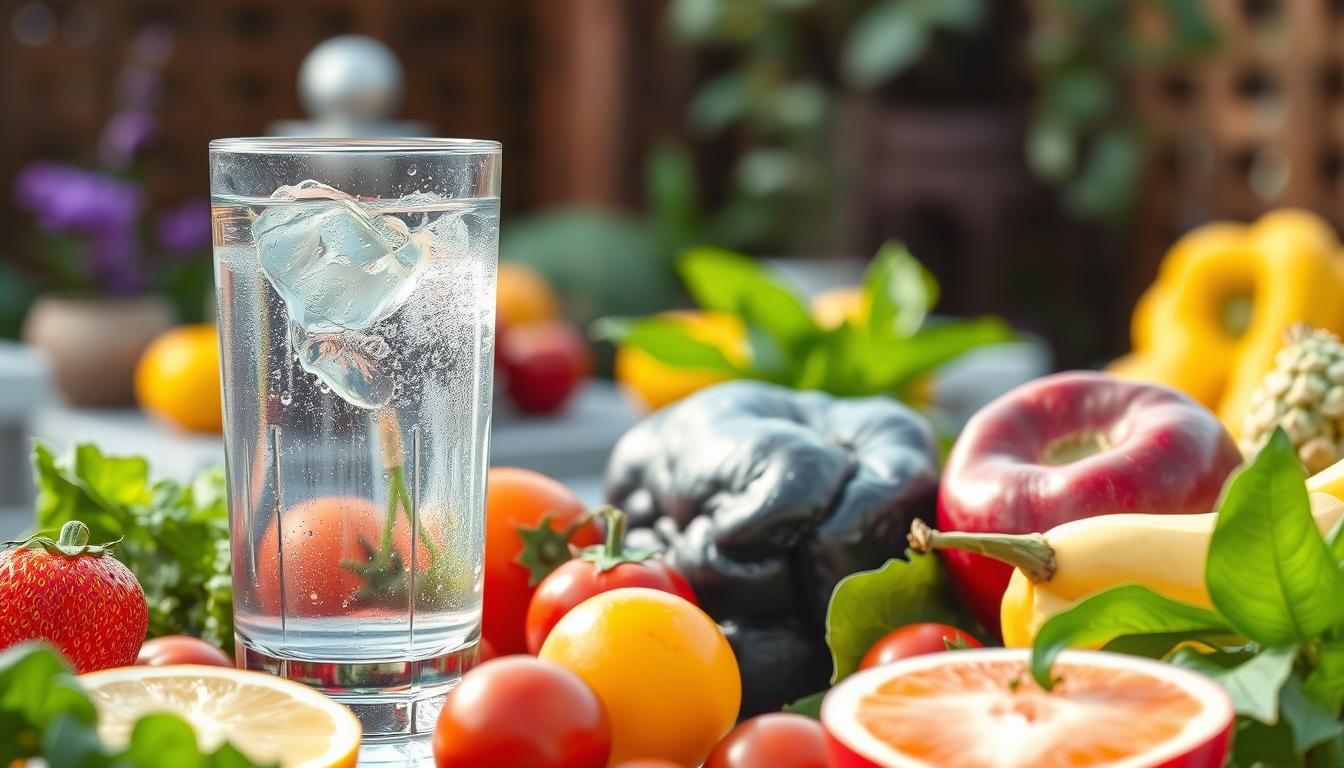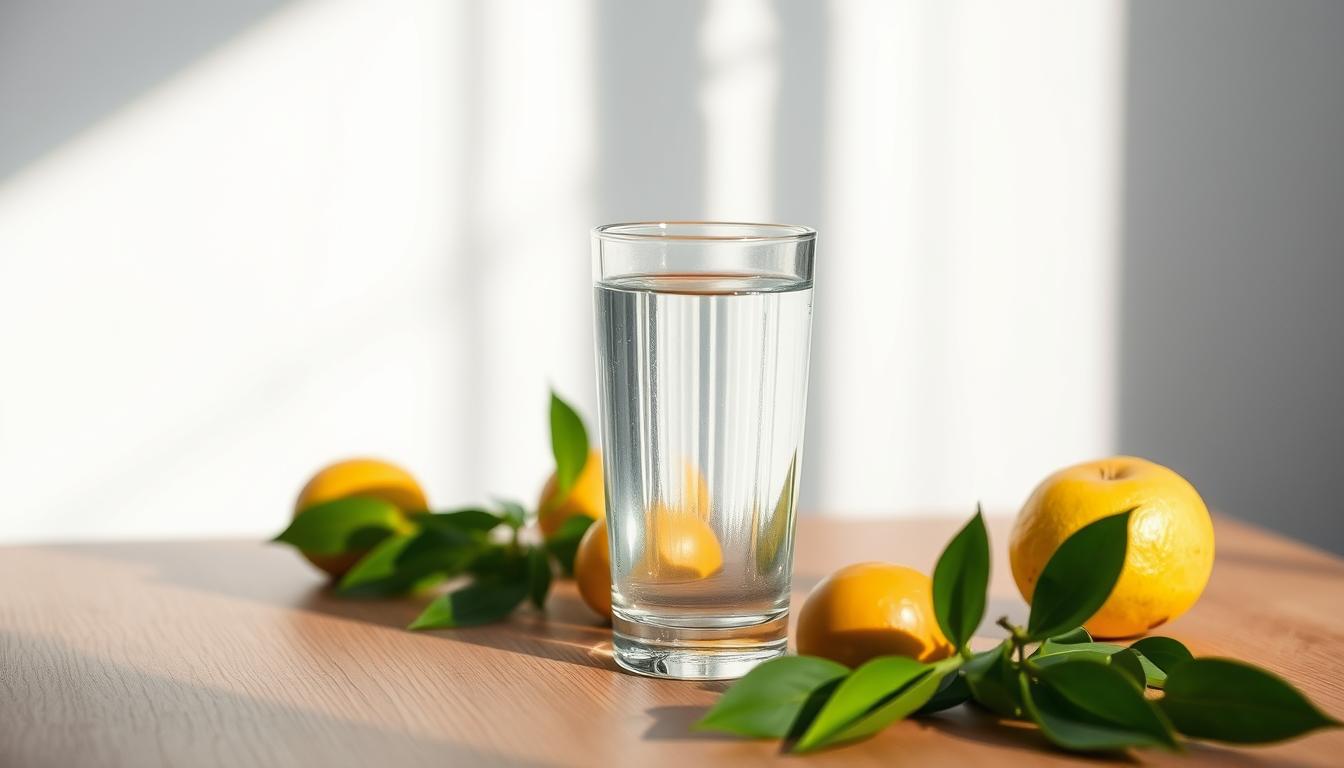When it comes to fasting, many people wonder if drinking water is allowed. In this article, I will provide you with the facts about water intake during fasting and the importance of staying hydrated. Whether you are practicing intermittent fasting or preparing for a medical procedure, understanding the role of water in your fasting journey is crucial.
Key Takeaways:
- Drinking water during intermittent fasting is generally permitted and recommended.
- Water does not break a fast and is essential for staying hydrated.
- Hydration is important for various bodily functions and can help manage hunger during fasting.
- Other calorie-free beverages like black coffee, unsweetened tea, and flavored water can also be consumed.
- Consult with healthcare professionals for personalized advice, especially before medical procedures.
The Importance of Hydration During Fasting
Staying hydrated is crucial during fasting, as adequate hydration supports important bodily functions and can help manage feelings of hunger. The human body is composed of about 60-70% water, and staying hydrated is essential for optimal physical and mental performance, digestion, energy levels, and kidney functions.
During fasting, drinking water is recommended to maintain hydration levels. It is generally advised to consume at least 2 quarts (9 cups for females, 13 cups for males) of water per day. Water does not break a fast, allowing individuals to remain in a fasted state. However, it is important to note that other calorie-free beverages like black coffee, unsweetened tea, flavored or sparkling water, and bone broth in small amounts may also be consumed during fasting.
The Benefits of Staying Hydrated During Fasting
There are several benefits of drinking water while fasting. Firstly, staying hydrated can help manage feelings of hunger, as dehydration can sometimes be mistaken for hunger. By ensuring proper hydration, individuals may experience reduced cravings and increased satiety during their fasting periods.
In addition, adequate hydration supports optimal physical and mental performance. Water is essential for maintaining energy levels, regulating body temperature, lubricating joints, and transporting nutrients throughout the body. By staying hydrated, individuals may experience improved focus, concentration, and overall well-being during fasting.
Furthermore, proper hydration is important for digestion and kidney functions. Water helps to facilitate the digestion of food and absorption of nutrients, ensuring that the body can effectively break down and utilize the nutrients consumed during eating periods. Additionally, staying hydrated supports optimal kidney function by helping to flush out waste products and maintain proper fluid balance in the body.
In summary, staying hydrated during fasting is essential for supporting bodily functions, managing hunger, and promoting overall well-being. Drinking at least 2 quarts of water per day, along with other calorie-free beverages, can help individuals maintain proper hydration levels and optimize their fasting experience.
Water and Intermittent Fasting
When it comes to intermittent fasting, one common concern is whether or not drinking water is allowed. The good news is that water is generally fine to consume during an intermittent fast. Unlike solid foods, water does not break a fast and has no effect on blood sugar or insulin levels. In fact, staying hydrated is crucial during fasting as it supports various bodily functions and can help manage feelings of hunger.
During an intermittent fast, it is recommended to drink water to maintain adequate hydration. The human body is made up of about 60-70% water, and dehydration can negatively impact physical and mental performance, digestion, energy levels, and kidney functions. Aim to drink at least 2 quarts (9 cups for females, 13 cups for males) of water per day to ensure proper hydration.
In addition to water, there are other calorie-free beverages that can be consumed while fasting. These include black coffee, unsweetened tea, flavored water, sparkling water, lemon water, and bone broth in small amounts. These drinks can help keep you hydrated and provide some important vitamins and minerals.
It is important to note that dry fasting, which restricts both food and water, is an exception and should only be done under medical supervision. For most intermittent fasting methods, drinking water is not only allowed but also highly recommended to support overall well-being during the fasting period.
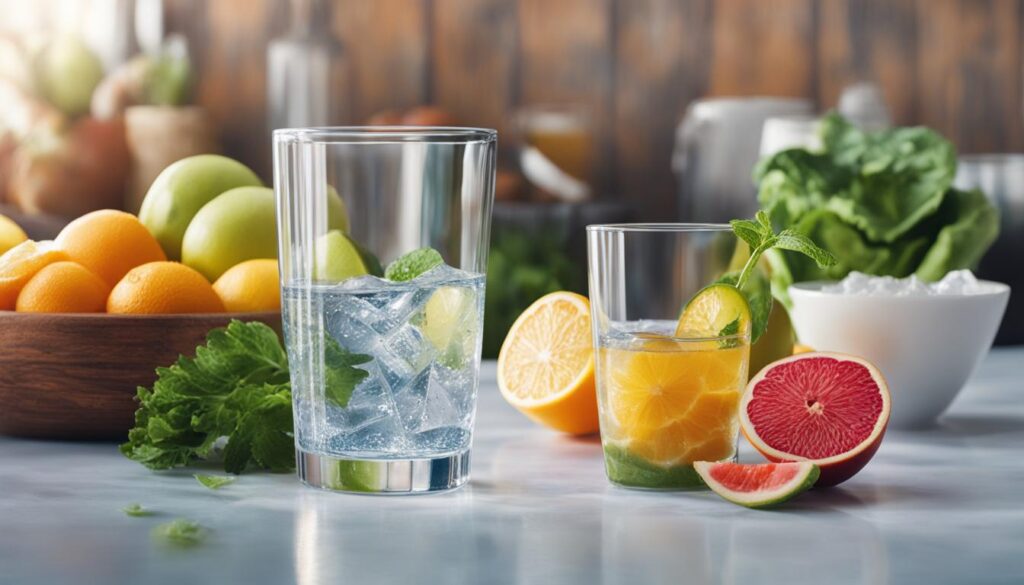
The Benefits of Drinking Water While Fasting
| Benefits | Description |
|---|---|
| Hydration | Water is essential for maintaining proper hydration levels and supporting various bodily functions. |
| Hunger Management | Drinking water can help manage feelings of hunger during fasting, making it easier to stick to your fasting schedule. |
| Improved Performance | Adequate hydration supports physical and mental performance, allowing you to stay focused and energized during your fasting period. |
| Digestion Support | Drinking water can aid in digestion and prevent constipation, which may be common during fasting. |
| Kidney Function | Proper hydration is important for kidney function and can help prevent kidney stones and other urinary tract issues. |
Fasting Before Medical Procedures
Before undergoing certain medical procedures, it is often necessary to fast in order to ensure an empty stomach and reduce the risk of complications. Fasting helps create a clear field of view for medical professionals and allows for more accurate test results. However, it’s important to note that not all liquids are restricted during this fasting period. Clear liquids, such as water, may be allowed up to 2 hours before the procedure.
Clear liquids like water are quickly digested by the body, making them less likely to interfere with the medical procedure. It is essential to follow the specific guidelines provided by your healthcare team regarding water intake before the procedure. These guidelines may specify the quantity of water allowed and the exact timing of when to stop drinking.
By adhering to the fasting requirements set by your healthcare team, you can help ensure the success and safety of your medical procedure. It is crucial to communicate any concerns or questions you may have to your healthcare provider so that they can provide you with the necessary information and guidance.
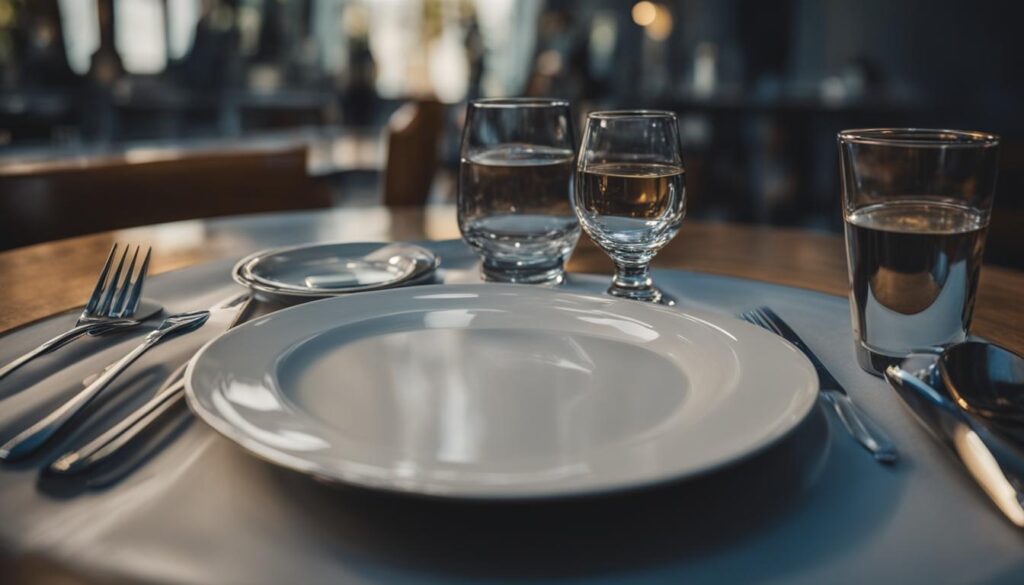
| Liquid | Description |
|---|---|
| Water | Plain water without any additives |
| Clear broth | Broth made from clear liquids, such as chicken or vegetable broth |
| Sparkling water | Carbonated water without any added flavors or sweeteners |
| Pulp-free fruit juice | Fruit juice without any pulp or fiber |
| Plain gelatin | Unflavored gelatin without any additional ingredients |
| Unsweetened tea | Tea without any added sweeteners or flavors |
| Clear ice pops | Icy treats made from clear liquids, such as fruit juice or water |
Other Fast-Friendly Drinks
Aside from water, there are various calorie-free beverages that can be enjoyed during fasting to keep you hydrated and provide some important vitamins and minerals. These fast-friendly drinks can help enhance your fasting experience while offering a refreshing taste. Here are some options:
- Black coffee: A popular choice among fasting enthusiasts, black coffee is a zero-calorie drink that can help suppress hunger and provide a boost of energy during your fasting window.
- Unsweetened tea: Whether it’s green tea, herbal tea, or black tea, opt for unsweetened versions to enjoy a flavorful drink without breaking your fast. Tea also offers antioxidants that promote overall health.
- Flavored water: If plain water gets boring, flavored water can be a great alternative. Look for options without added sugar or artificial sweeteners to ensure you’re staying within your fasting guidelines.
- Sparkling water: Sparkling water adds a delightful fizz to your hydration routine. It’s a refreshing choice that can help curb your cravings without any calories.
- Lemon water: Squeezing some fresh lemon into your water can add a burst of flavor and provide a dose of vitamin C. Just be mindful of the acidity if you have sensitive teeth.
- Bone broth: While not a traditional drink, sipping on a warm cup of bone broth can provide nourishment and replenish electrolytes during your fasting periods.
These fast-friendly drinks can not only quench your thirst but also contribute to your overall fasting experience. Remember to always listen to your body and choose options that align with your fasting goals and guidelines.
Safe Liquids for Medical Procedures
When preparing for a medical procedure, it is important to follow specific guidelines regarding your liquid intake. Clear liquids are typically allowed up to a certain number of hours before the procedure to ensure an empty stomach. Here are some safe liquids that may be permitted:
“Clear liquids like sparkling water, flavored water, clear broth, pulp-free fruit juice, plain gelatin, unsweetened tea, and clear ice pops can be consumed before your surgery or procedure.”
These clear liquids are easily digested and provide hydration without interfering with the medical procedure. It is crucial to consult with your healthcare team for personalized instructions on which liquids are allowed and how long before the procedure you should stop consuming them.
Ensuring your hydration needs are met before a medical procedure is essential for your well-being and the success of the procedure. Following the recommended guidelines will help reduce the risk of complications and ensure a smoother experience.
| Liquid | Description |
|---|---|
| Sparkling Water | Carbonated water without added flavors or sweeteners. |
| Flavored Water | Water infused with natural flavors like lemon or cucumber. |
| Clear Broth | Transparent soup made from strained vegetables or meat. |
| Pulp-free Fruit Juice | Fruit juice without any pieces of fruit pulp. |
| Plain Gelatin | Unflavored gelatin that turns into a clear gel when mixed with water. |
| Unsweetened Tea | Tea without any added sugar or sweeteners. |
| Clear Ice Pops | Frozen treats made from clear liquids, like fruit juice or electrolyte solutions. |
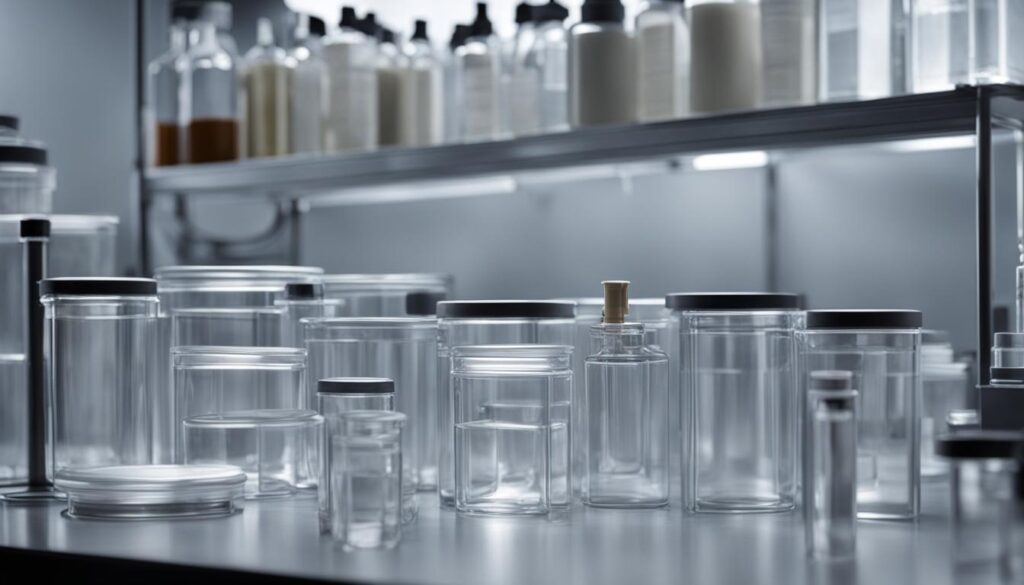
Drinks to Avoid While Fasting
While staying hydrated is important during fasting, there are certain drinks that should be avoided to ensure the effectiveness of your fasting period. These beverages can break your fast and may have negative effects on your body. Here are some drinks to avoid while fasting:
- Soda: Sugary carbonated drinks like soda are high in calories and can spike your blood sugar levels, breaking your fast.
- Sweet Tea: Similar to soda, sweetened teas contain added sugars that can disrupt your fasting state.
- Sports Drinks: Although sports drinks can provide hydration and electrolytes, they often contain added sugars and calories that can interfere with your fasting goals.
- Coffee with Milk, Cream, or Sugar: While black coffee is generally acceptable during fasting, adding milk, cream, or sugar can increase calorie intake and potentially break your fast.
- Energy Drinks: Energy drinks are typically loaded with sugar and caffeine, which can negatively impact your fasting journey.
- Smoothies: Smoothies, especially those with added fruits and sweeteners, can be high in calories and may disrupt your fasting period.
- Milk: Dairy milk contains carbohydrates and proteins that can raise insulin levels, breaking your fast.
- Alcohol: Alcoholic beverages are high in calories and can affect liver function, making them unsuitable during fasting.
It’s important to remember that these drinks can vary in their effects depending on the type and duration of your fasting protocol. If you have any concerns or questions about specific drinks, it’s best to consult with your healthcare professional or fasting expert.
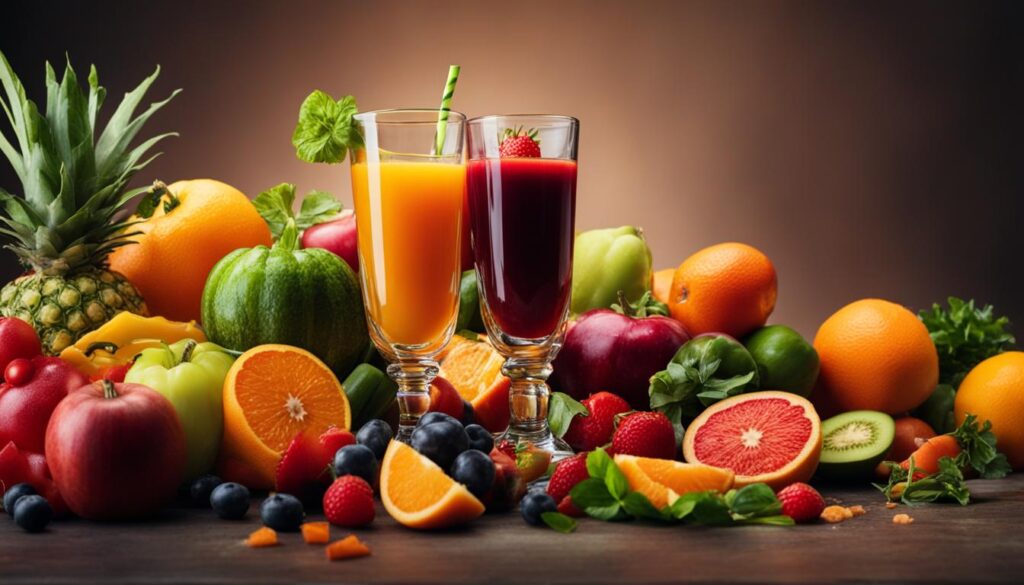
“During fasting, it’s crucial to avoid drinks that contain added sugars, calories, or any ingredients that can raise insulin levels. Stick to water, black coffee, and unsweetened tea to stay hydrated and support your fasting goals.” – Fasting Expert
Conclusion: Stay Hydrated During Your Fasting Journey
In conclusion, maintaining proper hydration is crucial during fasting to support various bodily functions and manage hunger. Drinking water while fasting is generally permitted and recommended, as it does not break the fast and helps you stay hydrated. In addition to water, other calorie-free beverages like black coffee, unsweetened tea, flavored water, and bone broth in small amounts can also be included in your fasting routine.
Staying hydrated during fasting has numerous benefits. It supports physical and mental performance, aids digestion, boosts energy levels, and promotes kidney functions. Proper hydration can also help manage hunger and cravings, making it easier to stick to your fasting schedule.
It is important to note that specific guidelines on water consumption may vary depending on the fasting method and any medical procedures you may have. It is crucial to consult with healthcare professionals to get personalized advice and instructions tailored to your unique situation.
Tips for Staying Hydrated During Fasting:
- Drink at least 2 quarts (9 cups for females, 13 cups for males) of water per day.
- Include other calorie-free beverages like black coffee, unsweetened tea, flavored water, and bone broth in moderation.
- Avoid drinks that break the fast, such as soda, sweet tea, sports drinks, coffee with milk or sugar, energy drinks, smoothies, milk, and alcohol.
- Follow any specific guidelines provided by your healthcare team regarding fasting and water intake before medical procedures.
By prioritizing hydration and following medical guidance, you can ensure a successful and healthy fasting journey.
| Benefits of Staying Hydrated During Fasting |
|---|
| Supports physical and mental performance |
| Aids digestion |
| Boosts energy levels |
| Promotes kidney functions |
| Helps manage hunger and cravings |
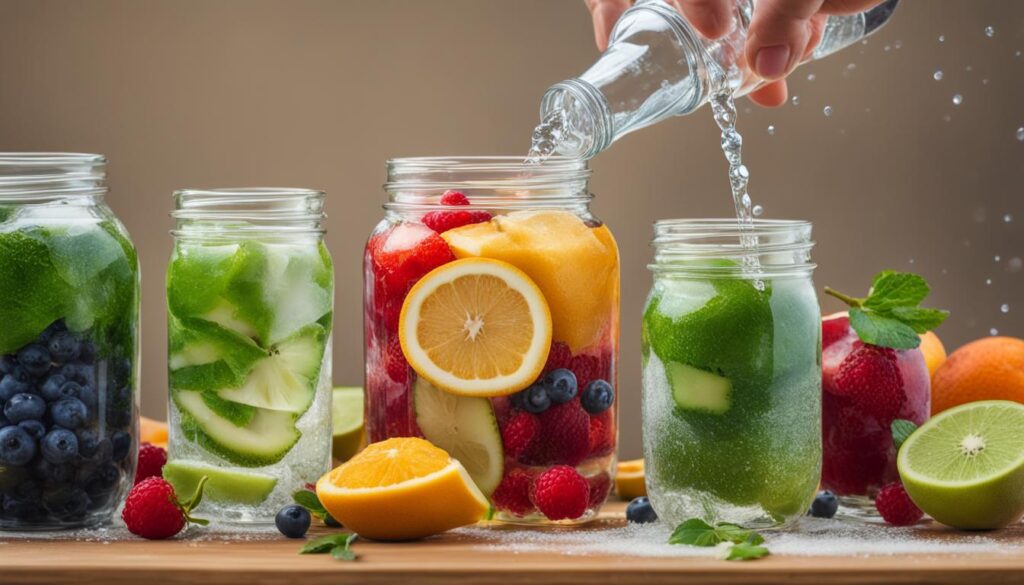
Conclusion
In conclusion, when it comes to the question “Can you drink water while fasting?”, the answer is usually yes. Drinking water during fasting is not only allowed but also important for maintaining hydration. Water does not break the fast and can help manage feelings of hunger during fasting periods.
Hydration plays a vital role in overall bodily functions, including physical and mental performance, digestion, and kidney processes. It is recommended to drink at least 2 quarts of water per day, along with other calorie-free beverages like black coffee, unsweetened tea, and flavored water.
However, it is crucial to note that specific guidelines regarding water intake may vary depending on the fasting method and medical procedures. It is always best to consult with healthcare professionals to receive personalized advice and ensure a safe fasting journey.
FAQ
Can I drink water while fasting?
Yes, drinking water is generally permitted and recommended during fasting. It helps to stay hydrated and does not break a fast.
How much water should I drink while fasting?
It is recommended to drink at least 2 quarts (9 cups for females, 13 cups for males) of water per day while fasting.
Can I drink other beverages besides water during fasting?
Yes, other calorie-free beverages like black coffee, unsweetened tea, flavored water, and bone broth in small amounts can be consumed during fasting.
Is water intake allowed before medical procedures?
Clear liquids like water may be allowed up to 2 hours before medical procedures, but it is important to consult with your healthcare team for specific guidelines.
Are there any drinks that should be avoided while fasting?
Yes, drinks like soda, sweet tea, sports drinks, coffee with milk or sugar, energy drinks, smoothies, milk, and alcohol should be avoided during fasting.
Is it safe to dry fast without drinking any water?
Dry fasting, which restricts all foods and liquids, including water, should be done under medical supervision and is not recommended for most individuals.
Are there any liquids besides water that are safe to consume before medical procedures?
Yes, clear liquids like sparkling water, flavored water, clear broth, pulp-free fruit juice, plain gelatin, unsweetened tea, and clear ice pops may be allowed before medical procedures. Consult with your healthcare team for specific details.


